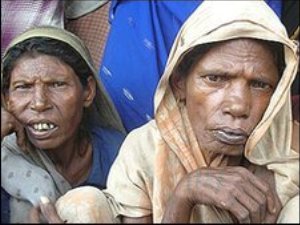Discrimination on the grounds of caste - or historic social standing in Hindu and Sikh communities - may be happening in the UK, a government peer has said.

Dalits have traditionally been subject to discrimination
But Baroness Thornton said evidence may exist. She has ordered more research.
She was speaking as peers accepted an amendment to the Equalities Bill, paving the way for such discrimination to be made illegal if necessary.
Hindu campaigners have long argued that members of the lower caste - referred to as Dalits or "untouchables" - suffer unfair treatment at the hands of higher caste members, even in second generation UK Asian communities.
Baroness Thornton told peers the National Institute of Economic and Social Research was due to present its research in July or August.
"We have looked for evidence of caste discrimination and we now think that evidence may exist, which is why we have now commissioned the research," she said.
"The proportionate thing is to take the power to deal with that discrimination if and when that evidence is produced."
Lord Avebury, for the Liberal Democrats, who moved the amendment, said he believed the research would "conclusively prove that caste discrimination does occur in the fields covered by the bill".
If it becomes law, the bill will require organisations of all sizes and types to promote equality and avoid discrimination in the workplace.
It will clarify existing discrimination legislation concerning sex, race, disability, sexual orientation, religion or belief and age, and ministers hope increased transparency will help tackle the pay gap between men and women.
Keith Porteous Wood, Executive Director of the National Secular Society, said the decision to commission research represented "a historic moment".
"The blight of caste discrimination, under which millions in India are regarded as 'untouchable', has spread to this country virtually unnoticed."

